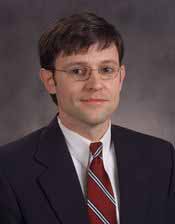
SCOTTSDALE, Ariz. (BP)–Safe to say, Religious Freedom Day probably isn’t the American Civil Liberties Union’s favorite government-approved event, despite their attempts to argue that they care deeply about the subject.
While the ACLU likes to promote itself as the prime defender of First Amendment rights, at least two of those rights are a sharp ideological thorn in the flesh for the organization: freedom of religion (if it involves publicly acknowledging God) and freedom of speech (if that speech is formed as a prayer).
President Bush’s proclamation of Religious Freedom Day, which is celebrated today, is bound then to set the collective teeth of the ACLU and its affiliated activists on edge, what with Bush’s insistence that “freedom is a gift from the Almighty” and all that, including an encouragement to commemorate the day in places of worship. The ACLU, after all, is only really fond of America when it’s being sledge-hammered into support for an atheistic agenda by complicit courts and pandering politicians.
And prayer in thankfulness to the Almighty might be a good thing on a day commemorating “the passage of the 1786 Virginia Statute for Religious Freedom, authored by Thomas Jefferson,” and “the First Amendment’s protection of religious freedom.”
Yet, somehow –- for all the ACLU’s aggressive efforts in courtrooms across America to eliminate invocations at city council meetings and graduation exercises and public events –- prayer persists. People just keep talking to God.
And some of them insist on doing it right out loud.
Loud leftists are especially fond of citing that old Quaker quote about “speaking truth to power.” It gives them courage -– the idea of standing up to a gracious, polite society, calling for the decimation of the essential tenets of Western civilization -– with no one to back them up but an omnipresent mass media, a posse of increasingly activist judges, and the glittery Hollywood Thought Police.
The irony, though, is that public prayer is the ultimate way of speaking truth to power.
At the 1994 National Prayer Breakfast, Mother Teresa, invited to share a few words, responded with some stabbingly plain truths about abortion:
“Any country that accepts abortion is not teaching its people to love one another but to use any violence to get what they want,” she said. “This is why the greatest destroyer of love and peace is abortion.”
Those words brought hundreds to their feet, but not President Bill Clinton –- or Mrs. Clinton, or Vice President and Mrs. Al Gore. Seats planted, faces set like stone, that quartet gazed, dazed, on the wizened old face of wisdom…and sat powerless, for a moment, in the face of the truth.
The fact is, praying virtually requires the speaking of truth to power –- since it’s hard to lie while talking to One who knows the truth, anyway. (Of course, if you don’t believe He knows everything … well, you probably feel a little foolish praying at all.) So public prayer means not only revealing our truest thoughts to others –- but affirming those beliefs to ourselves. Not to be seen by men, mind you. But exercising the right to pray at appropriate times as our tradition of religious liberty has always allowed and encouraged in this country, since our Founders acknowledged openly that our rights are not granted by the state but by a Higher Power.
Maybe that’s why ACLU attorneys balk and rage at the prospect of public prayer. The truth is not always something most of us -– including the ACLU crowd -– are fond of hearing.
For the truth is, people have a right to speak, publicly, not only their vulgarities, but their beliefs. People have a right to distribute, publicly, not only atheist journals and non-religious books –- but Bibles and Gospel tracts, too. A community has a right to publicly celebrate its heritage -– even when that history is Christian.
There’s still a difference between acknowledging a faith and endorsing it. And there is a power greater than mere government, stronger than any law, and more enduring than any microphone or TV camera.
When -– as individuals, as churches, as communities, as a nation -– we speak His truth, that power can change anything.
Even the hearts of the ACLU.
–30–
Mike Johnson is senior legal counsel with the Alliance Defense Fund (www.telladf.org), an organization that defends religious liberties.

















